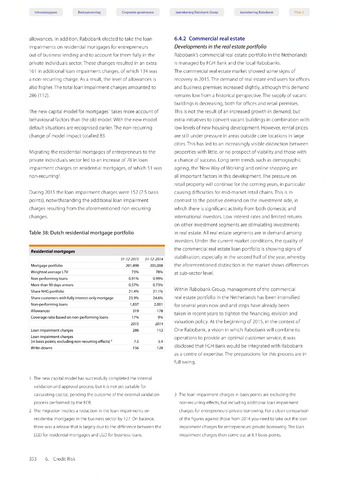Inhoudsopgave Bestuursverslag Corporate governance
allowances. In addition, Rabobank elected to take the loan
impairments on residential mortgages for entrepreneurs
out of business lending and to account for them fully in the
private individuals sector. These changes resulted in an extra
161 in additional loan impairment charges, of which 134 was
a non-recurring charge. As a result, the level of allowances is
also higher.The total loan impairment charges amounted to
286 (112).
The new capital model for mortgages1 takes more account of
behavioural factors than the old model. With the new model
default situations are recognised earlier.The non-recurring
change of model impact totalled 83.
Migrating the residential mortgages of entrepreneurs to the
private individuals sector led to an increase of 78 in loan
impairment charges on residential mortgages, of which 51 was
non-recurring2.
During 2015 the loan impairment charges were 152 (7.5 basis
points), notwithstanding the additional loan impairment
charges resulting from the aforementioned non-recurring
changes.
Table 38: Dutch residential mortgage portfolio
Residential mortgages
31-12-2015
31-12-2014
Mortgage portfolio
201,498
205,008
Weighted average LTV
73%
78%
Non-performing loans
0.91%
0.99%
More than 90 days arrears
0.57%
0.73%
Share NHG portfolio
21.4%
21.1%
Share customers with fully interest-only mortgage
23.9%
24.6%
Non-performing loans
1,837
2,001
Allowances
319
178
Coverage ratio based on non-performing loans 17% 9%
2015
2014
Loan impairment charges
286
112
Loan impairment charges
(in basis points, excluding non-recurring effects)3
7.5
5.4
Write-downs
156
128
1 The new capital model has successfully completed the internal
validation and approval process, but it is not yet suitable for
calculating capital, pending the outcome of the external validation
process performed by the ECB.
2 The migration implies a reduction in the loan impairments on
residential mortgages in the business sector by 127. On balance,
there was a release that is largely due to the difference between the
LGD for residential mortgages and LGD for business loans.
Jaarrekening Rabobank Groep Jaarrekening Rabobank
6.4.2 Commercial real estate
Developments in the real estate portfolio
Rabobank's commercial real estate portfolio in the Netherlands
is managed by FGH Bank and the local Rabobanks.
The commercial real estate market showed some signs of
recovery in 2015. The demand of real estate end users for offices
and business premises increased slightly, although this demand
remains low from a historical perspective. The supply of vacant
buildings is decreasing, both for offices and retail premises.
This is not the result of an increased growth in demand, but
extra initiatives to convert vacant buildings in combination with
low levels of new housing development. However, rental prices
are still under pressure in areas outside core locations in large
cities.This has led to an increasingly visible distinction between
properties with little, or no prospect of viability and those with
a chance of success. Long term trends such as demographic
ageing, the 'New Way of Working'and online shopping are
all important factors in this development.The pressure on
retail property will continue for the coming years, in particular
causing difficulties for mid-market retail chains.This is in
contrast to the positive demand on the investment side, in
which there is significant activity from both domestic and
international investors. Low interest rates and limited returns
on other investment segments are stimulating investments
in real estate. All real estate segments are in demand among
investors. Under the current market conditions, the quality of
the commercial real estate loan portfolio is showing signs of
stabilisation, especially in the second half of the year, whereby
the aforementioned distinction in the market shows differences
at sub-sector level.
Within Rabobank Group, management of the commercial
real estate portfolio in the Netherlands has been intensified
for several years now and and steps have already been
taken in recent years to tighten the financing, revision and
valuation policy. At the beginning of 2015, in the context of
One Rabobank, a vision in which Rabobank will combine its
operations to provide an optimal customer service, it was
disclosed that FGH Bank would be integrated with Rabobank
as a centre of expertise. The preparations for this process are in
full swing.
3 The loan impairment charges in basis points are excluding the
non-recurring effects, but including additional loan impairment
charges for entrepreneurs' private borrowing. For a clean comparison
of the figures against those from 2014 you need to take out the loan
impairment charges for entrepreneurs' private borrowing. The loan
impairment charges then come out at 6.1 basis points.
353 6. Credit Risk

